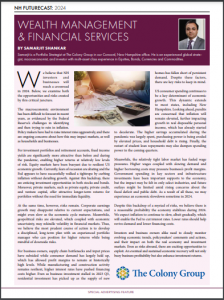NH Futurecast: 2024
We believe that NH investors and businesses will reach a crossroad in 2024. Below, we examine both the opportunities and risks created by this critical juncture.
The macroeconomic environment has been difficult to forecast in recent years, as evidenced by the Federal Reserve’s challenges in identifying and then trying to rein in inflation. Policy makers have had to raise interest rates aggressively, and there are ongoing concerns about how this may impact markets, as well as households and businesses.
For investment portfolios and retirement accounts, fixed income yields are significantly more attractive than before and during the pandemic, enabling higher returns at relatively low levels of risk. Equity markets have been buoyant due to resilient US economic growth. Currently, fears of recession are abating and the Fed appears to have successfully walked a tightrope by curbing inflation without derailing growth. Against this backdrop, there are enticing investment opportunities in both stocks and bonds. Moreover, private markets, such as private equity, private credit, and venture capital, offer attractive longer-term returns for portfolios without the need for immediate liquidity.
At the same time, however, risks remain. Corporate earnings growth may disappoint relative to current expectations, and might even slow as the economic cycle matures. Meanwhile, geopolitical risks are elevated, which coupled with economic uncertainty, may rekindle volatility in financial markets. Thus, we believe the most prudent course of action is to develop a disciplined, long-term plan with an experienced portfolio manager who can position for higher returns while being mindful of downside risks.
For business owners, supply chain bottlenecks and input prices have subsided while consumer demand has largely held up, which has allowed profit margins to remain at historically high levels. While manufacturing and construction activity remains resilient, higher interest rates have pushed financing costs higher. Even as business investment stalled in 2023 Q3, residential investment has picked up as the supply of new homes has fallen short of persistent demand. Despite these factors, there are key risks to keep in mind.
US consumer spending continues to be a key determinant of economic growth. This dynamic extends to most states, including New Hampshire. Looking ahead, pundits are concerned that inflation will remain elevated, further impacting growth in real disposable personal income, which has already started to decelerate. The higher savings accumulated during the pandemic was largely spent, purchasing power is being eroded by elevated prices, and household debt is rising. Finally, the restart of student loan repayments may also dampen spending power in the coming quarters.
Meanwhile, the relatively tight labor market has fueled wage pressures. Higher wages coupled with slowing demand and higher borrowing costs may pressure business’s profit margins. Government spending in key sectors and infrastructure investments have been important supports to the economy, but the impact may be felt in only select industries, and future outlays might be limited amid rising concerns about the fiscal deficit and public debt. As a result of all these, we may experience an economic slowdown in sometime in 2024.
Despite this backdrop of a myriad of risks, we believe there is a reasonable probability the economy stabilizes during 2024. We expect inflation to continue to slow, albeit gradually, which will enable the Fed to cut interest rates. Lower rates should help revive demand and lower financing costs.
Investors and business owners alike need to closely monitor evolving economic trends, policymakers’ comments and actions, and their impact on both the real economy and investment markets. Even as risks abound, there are exciting opportunities to exploit. An eventual and sustained economic recovery will not only buoy business profitability but also enhance investment returns.


